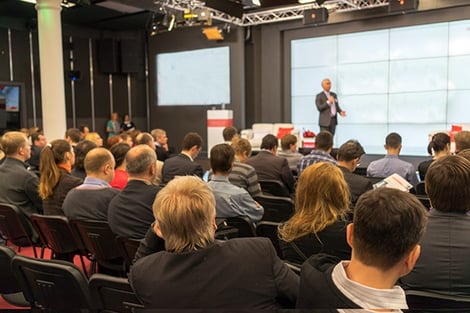Almost every business and company hopes to organise one or more high-quality, high-impact annual events and invests a lot of money and effort in them. But why are these events so important? What are their benefits? How should they be organized? Here you will find all the answers and key factors for making your event a success.
What is an event mainly for?
 Regardless of the type of event chosen, a conference, all-day event, meeting, etc., company events and meetings are very powerful and effective communication tools. Their main purpose is to establish, promote and intensify personal contacts, both inside and outside the company. This is what is known as networking.
Regardless of the type of event chosen, a conference, all-day event, meeting, etc., company events and meetings are very powerful and effective communication tools. Their main purpose is to establish, promote and intensify personal contacts, both inside and outside the company. This is what is known as networking.
Networking is a key factor in any company’s growth or development strategy since, among other things, it permits the company to gain recognition and prominence in its sector, increase sales and explore new lines of business.
Other additional benefits
Along with facilitating and promoting face-to-face relationships, company events have another series of benefits, such as:
- Improving the working environment and promoting relationships between employees who work at the same company.
-
Generating and disseminating corporate content.
-
Promoting business and sales.
-
Giving out awards for achievement and recognising successes
How to organise an event properly
Although it may seem simple beforehand, organising an event effectively is indeed not an easy task. To consider an event a success it must serve to create valuable contacts and achieve other objectives, such as increasing sales, generating value-added content and offering a positive image of the company organising it.
Another basic issue is controlling the costs and making the budget fit the objective of bringing a positive return on investment.
Top hints and strategies
Below is a list of what seem to us to be the most appropriate strategies and hints for ensuring success when organising any type of event.
1. Define the objectives properly
List the objectives of the event in the greatest detail possible, as it is essential to be able to measure them qualitatively and/or quantitatively so that the event can then unfold easily and smoothly, reflecting the message that it is intended to convey.
2. Give priority to the content not the container
Rather than the place and the stage on which it will take place (which is known as the container), what is really important in an event is the subject matter that will be dealt with and the way it is handled, in other words, the content.
Good content will help you to make and maintain quality contacts and achieve real profitability and effectiveness.
3. Use technology
Today, the technology that is applied to events is highly developed and can give really spectacular results both for the creation and the dissemination of content and in the aesthetics.
The possibilities are endless and are constantly changing: 3-D videos, high-quality videoconferencing, online classes, mapping, etc. These techniques open up a wide spectrum of original and imaginative possibilities and new formats.
4. Maintain a flow of communication
Not only is the event itself important, it must also create a constant flow of communication, which is very easy to do these days thanks to the social networks. Using them, the experience can be extended over time as much as possible and a connecting link with colleagues and customers maintained. Promoting the event before it is held and prolonging its life afterwards will be easy with the power now offered by social media.
5. Manage expenses properly
Sticking to the budget is not only desirable but a real necessity. To properly manage the expenditure, it is vital to take into account all the issues and factors, use some special software and, in some cases, get advice from the outside.
6. Add something original
To call attention to the event, improve the attendees’ experience and imprint it on their memories, something original must be added, with ideas that go beyond the usual fare or hackneyed clichés. Innovate, be creative and think outside the box. Since most of your audience will already have attended many conferences and events, it is very important that yours stand out.
 7. Use specialist companies
7. Use specialist companies
The complexity of some events makes it very convenient and advisable to use a specialist company to organise it. In this way, you will increase its quality and originality, have more control over the final budget and make optimal use of resources.
A very effective way of connecting with the audience and grabbing their attention is to hire external human resources, such as well-known lecturers, presenters, speakers or even comedians or actors.
8. Include sustainable or CSR initiatives
Including sustainable or CSR actions in the event programme will benefit your company. In spite of the additional cost, they serve as a practical demonstration of the company’s commitment to the environment. And this always has a positive value for the corporate image. One example could be to give a sustainable gift, use Km-0 products or even promote paperlessness, since the organisation of an event often leads to the generation of an enormous amount of waste. Trying to eliminate the use of paper will be essential.
In the same vein, including activities to contribute to Corporate Social Responsibility is now a very important factor and will be well received by the attendees, especially the younger generation.
This is just some advice for organising your event. Combined with good planning, teamwork and motivation, you will have the perfect elements for making your company event a success ;-)





